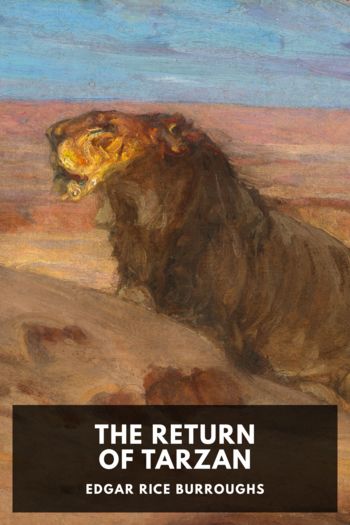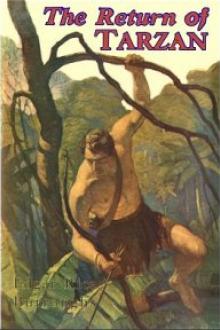The Return of Tarzan by Edgar Rice Burroughs (read any book txt) 📕

- Author: Edgar Rice Burroughs
Book online «The Return of Tarzan by Edgar Rice Burroughs (read any book txt) 📕». Author Edgar Rice Burroughs
Tarzan went to the brook first, and slaked his thirst. Then he approached his cabin. The door was still closed and latched as he and D’Arnot had left it. He raised the latch and entered. Nothing had been disturbed; there were the table, the bed, and the little crib built by his father—the shelves and cupboards just as they had stood for over twenty-three years—just as he had left them nearly two years before.
His eyes satisfied, Tarzan’s stomach began to call aloud for attention—the pangs of hunger suggested a search for food. There was nothing in the cabin, nor had he any weapons; but upon a wall hung one of his old grass ropes. It had been many times broken and spliced, so that he had discarded it for a better one long before. Tarzan wished that he had a knife. Well, unless he was mistaken he should have that and a spear and bows and arrows before another sun had set—the rope would take care of that, and in the meantime it must be made to procure food for him. He coiled it carefully, and, throwing it about his shoulder, went out, closing the door behind him.
Close to the cabin the jungle commenced, and into it Tarzan of the Apes plunged, wary and noiseless—once more a savage beast hunting its food. For a time he kept to the ground, but finally, discovering no spoor indicative of nearby meat, he took to the trees. With the first dizzy swing from tree to tree all the old joy of living swept over him. Vain regrets and dull heartache were forgotten. Now was he living. Now, indeed, was the true happiness of perfect freedom his. Who would go back to the stifling, wicked cities of civilized man when the mighty reaches of the great jungle offered peace and liberty? Not he.
While it was yet light Tarzan came to a drinking place by the side of a jungle river. There was a ford there, and for countless ages the beasts of the forest had come down to drink at this spot. Here of a night might always be found either Sabor or Numa crouching in the dense foliage of the surrounding jungle awaiting an antelope or a water buck for their meal. Here came Horta, the boar, to water, and here came Tarzan of the Apes to make a kill, for he was very empty.
On a low branch he squatted above the trail. For an hour he waited. It was growing dark. A little to one side of the ford in the densest thicket he heard the faint sound of padded feet, and the brushing of a huge body against tall grasses and tangled creepers. None other than Tarzan might have heard it, but the ape-man heard and translated—it was Numa, the lion, on the same errand as himself. Tarzan smiled.
Presently he heard an animal approaching warily along the trail toward the drinking place. A moment more and it came in view—it was Horta, the boar. Here was delicious meat—and Tarzan’s mouth watered. The grasses where Numa lay were very still now—ominously still. Horta passed beneath Tarzan—a few more steps and he would be within the radius of Numa’s spring. Tarzan could imagine how old Numa’s eyes were shining—how he was already sucking in his breath for the awful roar which would freeze his prey for the brief instant between the moment of the spring and the sinking of terrible fangs into splintering bones.
But as Numa gathered himself, a slender rope flew through the air from the low branches of a nearby tree. A noose settled about Horta’s neck. There was a frightened grunt, a squeal, and then Numa saw his quarry dragged backward up the trail, and, as he sprang, Horta, the boar, soared upward beyond his clutches into the tree above, and a mocking face looked down and laughed into his own.
Then indeed did Numa roar. Angry, threatening, hungry, he paced back and forth beneath the taunting ape-man. Now he stopped, and, rising on his hind legs against the stem of the tree that held his enemy, sharpened his huge claws upon the bark, tearing out great pieces that laid bare the white wood beneath.
And in the meantime Tarzan had dragged the struggling Horta to the limb beside him. Sinewy fingers completed the work the choking noose had commenced. The ape-man had no knife, but nature had equipped him with the means of tearing his food from the quivering flank of his prey, and gleaming teeth sank into the succulent flesh while the raging lion looked on from below as another enjoyed the dinner that he had thought already his.
It was quite dark by the time Tarzan had gorged himself. Ah, but it had been delicious! Never had he quite accustomed himself to the ruined flesh that civilized men had served him, and in the bottom of his savage heart there had constantly been the craving for the warm meat of the fresh kill, and the rich, red blood.
He wiped his bloody hands upon a bunch of leaves, slung the remains of his kill across his shoulder, and swung off through the middle terrace of the forest toward his cabin, and at the same instant Jane Porter and William Cecil Clayton arose from a sumptuous dinner upon the Lady Alice, thousands of miles to the east, in the Indian Ocean.
Beneath Tarzan walked Numa, the lion, and when the ape-man deigned to glance downward he caught occasional glimpses of the baleful green eyes following through the darkness. Numa did not roar now—instead, he moved stealthily, like the shadow of a great cat; but yet he took no step that did not reach the sensitive ears of the ape-man.
Tarzan wondered if he would stalk him to his cabin door. He hoped not, for that would mean a night’s sleep curled in the crotch of a tree, and he much preferred the bed of grasses within his own abode.





Comments (0)